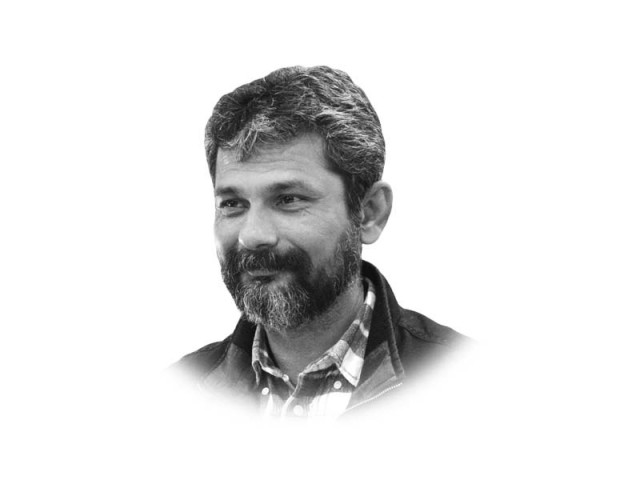A state of intolerance
Unfortunately, the source of societal intolerance in Pakistan is the state itself

The writer works as head of programmes for the Free and Fair Election Network
Tolerance for difference and diversity is one of the basic conditions for a democracy to prosper, which undoubtedly is in short supply in Pakistan. Without tolerance, space for emancipation of religious, political and ethnic diversity and expression shrinks, enhancing social exclusion on the basis of an individual’s or group’s origin, experience, circumstances and beliefs. The excluded groups become vulnerable and their mobility and expression subdued.
Unfortunately, the source of societal intolerance in Pakistan is the state itself. The Pakistani state has exhibited its intolerance quite often. Its intolerance clearly has a trickle-down effect on society where space for free expression and speech is gradually and systematically shrinking. The action against a television channel a couple of years ago and more recently against a leader of a political party is only a reflection of the viciousness that the state can resort to when what is expressed is not to its liking. In both cases, justice appeared to be on the side of the state than the cause of justice itself. The case of Akbar Bugti is another example of the extremes that the state may go to in case of an intellectual or political disagreement. Negotiation should always be the first resort before the state’s repressive arm comes into play.

The point is not to vindicate anyone’s actions but to emphasise the role of the state, which should focus more on listening to and addressing the dissent rather than snubbing and stifling it. This is only possible when the state assumes the role of a neutral umpire just as any state that proclaims to be pluralist should. Such a state allows societal groups to argue and contest and only intervenes when laws are violated. Unfortunately, the Pakistani state becomes a party in political, ideological and religious duels, and therefore, undermines its credentials of neutrality. Even in the case a law is being violated, the judicial arm should act and decide on the merits of the violation. The repressive arm should seldom be used unlike in Pakistan where it is usually the first choice.
An intolerant state infects societal groups which breed on its support and have the leeway of imposing their brand of religion or political ideology. Groups kowtowing to the state are powerful to an extent that they determine the space for public discourse. With decades of the state’s platonic affair with politico-religious groups and jihadi outfits, there is hardly any space left for discussing diverse religious or political views, particularly by groups who are in a minority. For instance, any person opposing the societal persecution of Ahmadis becomes a victim of right-wing groups who cannot tolerate any dissent even when the position is based on constitutional rights. There is a choice of either agreeing with the powerful ideology or facing wrath. The killing of Salmaan Taseer for his expression is another example of societal intolerance. He expressed his concern at the misuse of the blasphemy laws but had to pay in blood for his beliefs.
Free expression is the essence of democracy. Stifling it sits at the core of authoritarianism. Although the Constitution under Article 19 guarantees freedom of speech, the right is subject “to reasonable restrictions imposed by law in the interest of the glory of Islam or the integrity, security or defense of Pakistan or any part thereof, friendly relations with foreign states, public order, decency or morality, or in relation to contempt of court, [commission of] or incitement to an offence”. The purview of restrictions is so wide that almost all thorny issues that the country is faced with are beyond the scope of public discourse. Take for example the role of the security establishment in politics. Without going into merits and demerits of the issue, a discussion on the topic is often beyond the pale of public discourse.
Also beyond discussion is the damaging roles that some of Pakistan’s very dear friends have played to reshape and distort our polity. Friendly countries have played their dirty games in Pakistan by fuelling sectarianism, creating irrevocably divisive fault lines drawn by blood and gore. The Pakistani security apparatus is investing more efforts in clearing the debris caused by the proxy wars of our friends than by our sworn enemy to the east. However, a public discourse on the terms on which Pakistan should engage with these friendly countries is almost a no-go area.
A responsible state invests in the social inclusion of its diverse people and protects their lawful actions and expression. It encourages debate, discourse and dialogue among social and political groups on a wide array of issues to develop a larger consensus rather than stifling dissenting voices. A country may have people of different religions and sects, race and ethnicity, colour and creed, and opinions and orientations, who do not have to agree to each word and wish of the state and its proteges. There has to be space for difference and diversity, which needs to be preserved for democracy to prosper. Tolerance only enhances the quality of democracy.
Published in The Express Tribune, July 10th, 2016.
Like Opinion & Editorial on Facebook, follow @ETOpEd on Twitter to receive all updates on all our daily pieces.














COMMENTS
Comments are moderated and generally will be posted if they are on-topic and not abusive.
For more information, please see our Comments FAQ